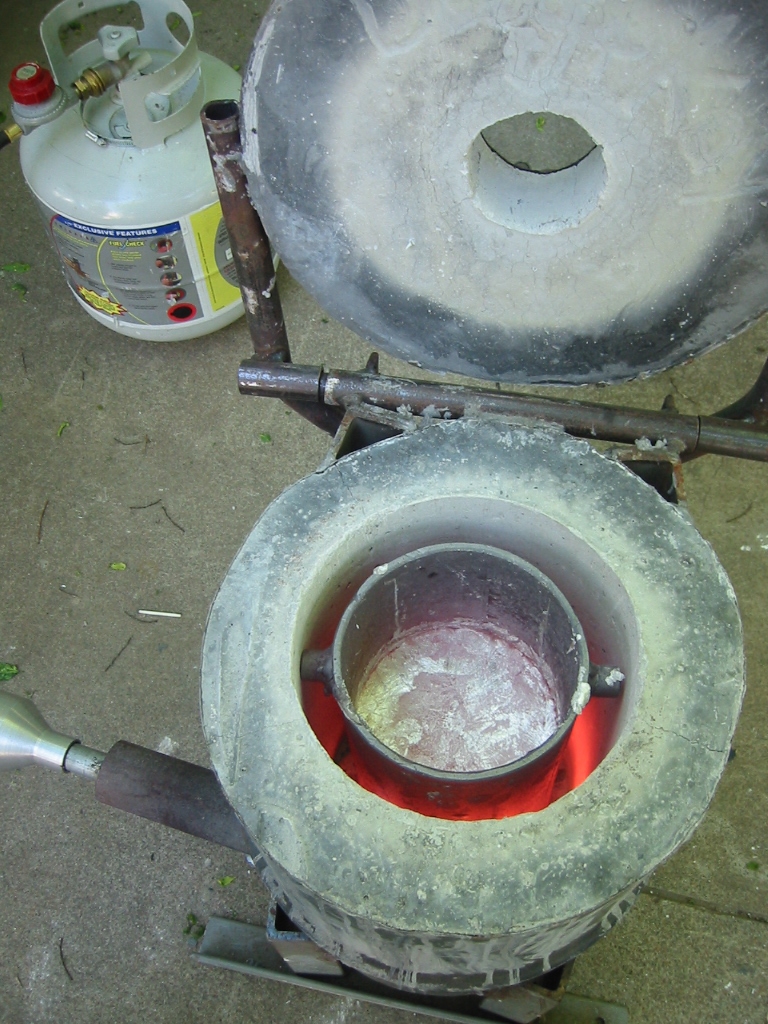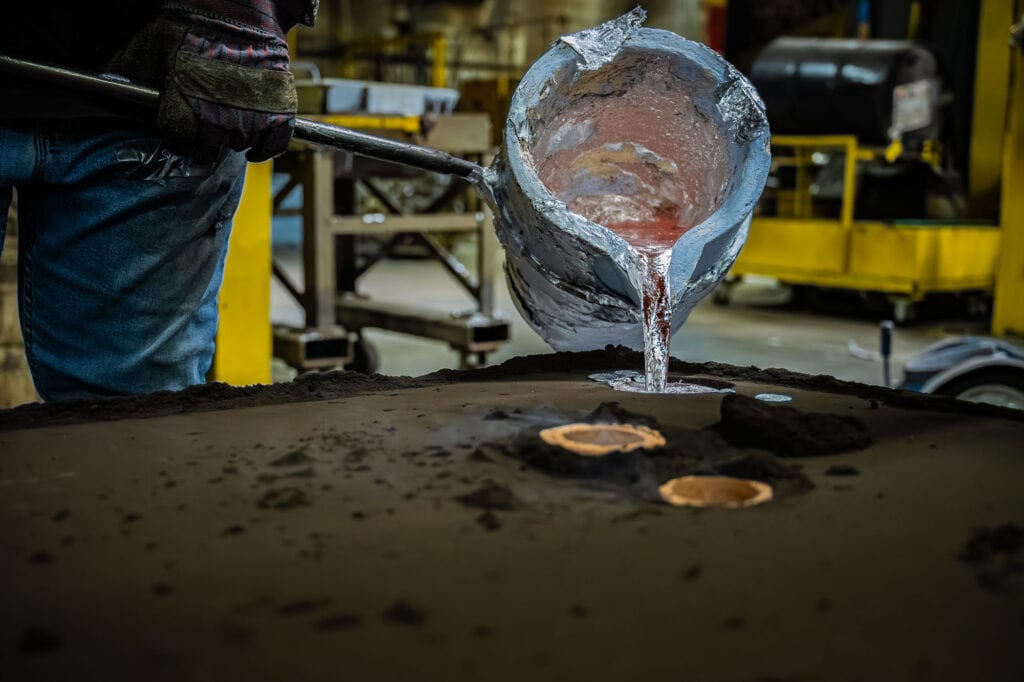Contrasting Metal Castings vs. Forged Components in Industrial Applications
Wiki Article
Discovering the Cutting-edge Strategies Used in Modern Aluminum Foundries
Modern aluminum foundries are going through a considerable transformation with the fostering of cutting-edge strategies. Advanced casting techniques, wise automation, and sustainable methods are improving production processes. These advancements not just enhance performance however likewise address environmental concerns. As the sector develops, the combination of electronic innovations plays a necessary function. Understanding these changes is essential for grasping the future of aluminum production and its effects for worldwide markets. What exists ahead in this vibrant market?Advanced Casting Techniques

Furthermore, developments in thermal control and mold layout have actually added to more consistent casting outcomes. These technologies enable for much better control of cooling prices, minimizing flaws and improving mechanical properties. Consequently, suppliers can produce light-weight yet resilient elements, satisfying the increasing demands of numerous industries, consisting of vehicle and aerospace, for high-performance aluminum components.
Smart Automation and Robotics
The combination of smart automation and robotics in aluminum foundries notes a substantial innovation in producing efficiency. These innovations make it possible for precision and consistency in manufacturing procedures, dramatically decreasing human mistake and enhancing security. Automated robot systems take care of repetitive jobs, such as molding, pouring, and air conditioning, allowing human drivers to focus on even more complicated duties that need critical thinking and oversight.In addition, smart sensors and AI-driven analytics give real-time data tracking, helping with predictive upkeep and reducing downtime. This brings about optimized resource allowance and improved power intake, adding to total sustainability in production.
The flexibility of robot systems permits for fast modifications to transforming production demands, enhancing versatility in production. As foundries increasingly adopt these advanced innovations, they not just boost functional performance yet also place themselves as leaders in advancement within the metal casting industry.
Additive Manufacturing in Foundries
Changing standard manufacturing methods, additive manufacturing is revolutionizing aluminum foundries by making it possible for the production of complicated geometries that were previously unattainable. This technique permits the layer-by-layer construction of parts, greatly minimizing product waste and reducing manufacturing times. Therefore, foundries can produce complex styles that boost efficiency and functionality, dealing with the expanding demands of various sectors.In addition, additive production facilitates rapid prototyping, permitting designers to examine and iterate layouts swiftly. This dexterity not only increases the advancement cycle yet also aids in identifying possible issues prior to full-blown production starts. The combination of advanced products and processes in additive production further improves the mechanical buildings of aluminum components, promoting advancement in product style. Aluminum foundries that embrace these strategies position themselves at the center of industry innovations, guaranteeing competition in an ever-evolving market landscape.
Sustainable Practices and Recycling
Lasting practices in aluminum foundries are significantly focused on improving recycling procedures and adopting eco-friendly casting methods. These technologies aim to minimize waste and power consumption while maximizing making use of recycled products. As the industry develops, the assimilation of sustainability into manufacturing techniques ends up being vital for meeting environmental requirements and customer needs.Recycling Process Improvements
As markets progressively acknowledge the environmental effect of waste, aluminum foundries are embracing innovative recycling procedure renovations to boost sustainability. These advancements concentrate on reducing energy intake and making the most of material recovery. Many foundries are applying closed-loop systems that reuse scrap aluminum produced during manufacturing, reducing waste and reducing the demand for virgin materials. Advanced sorting modern technologies, such as automatic optical sorting, improve the separation of different aluminum grades, raising the effectiveness of the recycling procedure. Furthermore, some foundries are utilizing hydrometallurgical approaches to recuperate aluminum from intricate waste streams. By integrating these improvements, aluminum foundries not just add to a circular economic situation but also lower their carbon impact, lining up with global sustainability objectives.Eco-Friendly Casting Techniques
While typical casting approaches usually entail considerable energy intake and material waste, aluminum foundries are progressively adopting environmentally friendly casting techniques that focus on sustainability. Techniques such as low-pressure die casting, which lessens air emissions, and making use of water-based mold and mildew releases add to reduced environmental influence. Additionally, innovations in 3D printing technology permit the production of complex mold and mildews with less product waste. Many foundries are additionally applying closed-loop systems that recycle water and aluminum scrap, additional lowering resource usage. By accepting renewable resource sources, such as solar and wind power, these facilities improve their sustainability initiatives. On the whole, the fostering of environmentally friendly methods in aluminum casting not just profits the environment yet also advertises economic effectiveness and innovation within the market.Boosted Quality Control Procedures
Boosted top quality control actions in aluminum foundries are increasingly reliant on advanced assessment innovations and real-time tracking systems. These advancements make it possible for suppliers to identify issues early and assure regular item high quality. By incorporating these tools, foundries can noticeably improve their functional efficiency and lower waste.Advanced Assessment Technologies
Advanced inspection modern technologies play an essential role in making certain the quality and integrity of aluminum spreadings. These cutting-edge techniques consist of non-destructive testing (NDT) techniques such as ultrasonic screening, radiographic screening, and swirl present assessments. Each technique enables for thorough exam of spreadings without endangering their architectural honesty. Advanced imaging strategies, such as computed tomography, give an extensive view of inner attributes, making it possible for the discovery of flaws like additions and voids. Additionally, automated optical evaluation systems enhance precision by using high-resolution electronic cameras and artificial intelligence algorithms to analyze surface area top quality. By carrying out these sophisticated evaluation technologies, aluminum foundries can effectively decrease flaws, making sure that castings fulfill rigorous industry criteria and customer demands.Real-Time Monitoring Solutions
As suppliers endeavor for excellence in aluminum casting, real-time surveillance systems become an essential improvement in quality assurance steps. These systems make use of sophisticated sensing units and data analytics to continuously track vital criteria during the casting process, such as pressure, alloy, and temperature level structure. By providing prompt feedback, they make it possible for operators to recognize discrepancies from perfect problems and make prompt modifications. This proactive method not only decreases flaws yet likewise boosts overall effectiveness and lowers waste - Wisconsin Aluminum Foundry. Additionally, combination of real-time data into manufacturing administration systems assists in better decision-making and improves traceability. Real-time monitoring systems play an essential function in preserving high criteria of top quality in modern-day aluminum foundries, ensuring that products meet strict industry requirements.Digital Double Innovation for Optimization

The integration of digital twin modern technology allows foundries to check various scenarios without interrupting real manufacturing. This capability fosters a positive technique to maintenance and source monitoring, eventually reducing waste and decreasing functional prices. Additionally, the technology aids in process optimization by enabling designers to envision the results of modifications in real-time, guaranteeing higher top quality outcomes. Consequently, aluminum foundries embracing digital twin modern technology are placed to achieve greater efficiency and competitiveness in a progressively requiring market.

Market 4.0 and IoT Combination
The adoption of digital twin technology in aluminum foundries becomes part of a broader activity in the direction of Sector 4.0, identified by the combination of the Net of Things (IoT) right into producing processes. This assimilation makes it possible for real-time tracking and data collection from various equipment and devices, causing enhanced functional effectiveness. Sensors installed in makers gather essential information, which is evaluated to enhance manufacturing operations and forecast upkeep needs.Additionally, IoT gadgets assist in interaction in between various manufacturing phases, permitting for smooth control and reducing downtime. By leveraging cloud computer, foundries can keep and analyze huge quantities of data, making it possible for even more informed decision-making. This technology also sustains remote management, where operators can look after procedures from anywhere, boosting responsiveness to manufacturing difficulties. In general, the fusion of Industry 4.0 and IoT within aluminum foundries is changing typical methods, making them much more nimble and responsive to market demands.
Frequently Asked Questions
What Are the Key Advantages of Aluminum Over Other Metals?
Aluminum supplies countless advantages over other steels, including its light-weight nature, outstanding corrosion resistance, high thermal and electric conductivity, malleability, and recyclability, making it a recommended selection for numerous applications throughout several sectors. - Metal CastingsExactly How Do Modern Foundries Manage Hazardous Materials?
Modern foundries handle harmful products with stringent safety protocols, advanced filtration systems, and recycling approaches. Normal training assurances employees comprehend finest methods, while checking systems find and minimize potential risks to maintain a safe workplace.What Is the Typical Lifespan of Aluminum Castings?
The typical life-span of aluminum spreadings varies from 20 to half a century, relying on elements such as ecological conditions, usage, and upkeep. Correct care can expand their longevity and efficiency significantly in time.Are There Any Wellness Dangers Connected With Aluminum Foundry Work?
Yes, aluminum shop job positions click here health threats, consisting of breathing issues from inhaling fumes and dirt, skin inflammation from contact with liquified metal, and potential direct exposure to unsafe chemicals. Appropriate precaution are important to alleviate these risks.Just How Do Factories Ensure Employee Security in High-Temperature Environments?
Factories execute extensive safety protocols, including safety gear, temperature tracking systems, and regular training. These procedures assure that workers are furnished to handle high-temperature environments, lessening threats and promoting a much safer workplace.
Numerous sophisticated casting strategies have emerged in aluminum foundries, reinventing typical processes. Sustainable methods in aluminum foundries are progressively concentrated on boosting reusing procedures and adopting environment-friendly casting strategies. Several foundries are implementing closed-loop systems that reuse scrap aluminum created throughout manufacturing, decreasing waste and reducing the need for virgin materials. While traditional casting methods typically include considerable power usage and material waste, aluminum foundries are progressively embracing environment-friendly casting methods that prioritize sustainability. While lots of markets are increasingly taking on digital innovations, aluminum foundries are leveraging digital twin modern technology to enhance functional performance and enhance manufacturing processes.
Report this wiki page